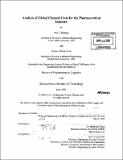Analysis of global channel costs for the pharmaceutical industry
Author(s)
Rimling, Eric C. (Eric Christopher); Seoh, Wontae Thomas
DownloadFull printable version (24.67Mb)
Other Contributors
Massachusetts Institute of Technology. Engineering Systems Division.
Advisor
Mahender Singh.
Terms of use
Metadata
Show full item recordAbstract
The pharmaceutical industry creates products which often have more than one supply chain channel, defined as a route through the supply chain network from sourcing to the end market. Each channel's specific cost characteristics are important to the pharmaceutical industry's ability to maintain positive profit margins while meeting high customer service requirements. Determining the optimal supply chain channel involves the analysis of fuel costs, logistics, taxes, wage differences, and many more. Additionally, variables such as time and risk significantly impact the total cost of a supply chain channel, but are extremely difficult to quantify. In this research, we identify the relevant channel costs and variables for the supply chain of a large pharmaceutical corporation. After identification, our study categorizes each cost based on level of measurability and causes of variability to develop a framework identifying the most relevant costs by four product types. We then analyze market forces that affect costs over a product's lifecycle. Finally, we develop an operational model for using the framework to compare costs across multiple supply chain channels and time horizons.
Description
Thesis (M. Eng. in Logistics)--Massachusetts Institute of Technology, Engineering Systems Division, 2009. Includes bibliographical references (leaves 77-78).
Date issued
2009Department
Massachusetts Institute of Technology. Engineering Systems DivisionPublisher
Massachusetts Institute of Technology
Keywords
Engineering Systems Division.